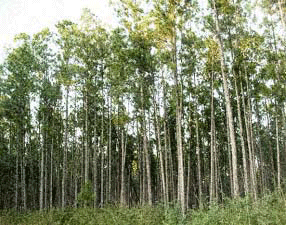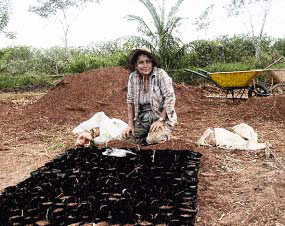Ecological forest farms, for their environmental regeneration of river basins
International Interest

Interest in this movement was sparked off by a film documentary on the first forest farms, shown on Cuban television’s ¨De Sol a Sol¨ programme (1997).
Results from more than 10 reports on forest farms representing the various hydrological regions of Cuba were illustrated in the 1998 Cuban Forestry Conference, which was attended by international institutions and personalities concerned with sustainable forestry development, arousing interest and approval. This novel system was the focus of attention in the 1st Conference on River Basin Soil Conservation and Management, held within the framework of the 2nd International Conference on the Environment and Development (1999).
The IIF presented some of its successful experiences, including the ecological forest farms, in the international workshops on the sustainable management of mountain areas held in Querétaro, México (1999), and Santo Domingo,
Dominican Republic (2000). Forest farms were also illustrated in the Regional Conference on Mountain Areas in Latin America and the Caribbean, held in Cuba in 2002. At the end of 2003, during the Ramal National Forest Forum, held in the city of Trinidad, the farms were awarded a prize for the outstanding results achieved in the Province of Las Tunas.
In 2001 and 2002, as a result of successful reforestation along the banks of the county’s rivers and reservoirs, within the framework of the National and Provincial River Basins Management Programme, forest farms featured in a number of national TV documentaries and promotional material produced by the Agriculture Ministry’s Estudios CAGUA and the UNDP’s film unit.
In 2003, during the 3rd Latin American Conference on River Basin Management, held in Arequipa, Perú, FAO organised a workshop entitled: Preparing a new generation of programmes for river basin management in Latin America and the Caribbean. In the workshop, it was agreed to encourage the establishment of pilot ecological forest farms in river basin areas.
During the Equator Initiative of the Johannesburg Summit on Sustainable Development (2002), the UNDP, the Canadian government, the International Development Research Centre and the World Conservation Union recognised ecological forest farms as one of the 25 most successful sustainable development projects in the world.
In the Province of Granma, 55 farms out of a total of 146 have been set up with the support of international organisations such as the UNDP, UNIFEM, UNOPS, and Italian decentralised cooperation from the regions of Sardinia, Liguria and the municipality of Foligno. Recently, OXFAM Canada, too, gave its backing to a capacity building project for technical personnel and forest farmers.
The IIF, as part of the management structure of this innovative scheme, promotes forest farms nationally and internationally, backed by research results going back more than 30 years. Research has led to the development of technology for forest development, the protection of woodland and the ecological exploitation of wood and non-wood forestry products, which employs environmental criteria for forest organisation, agro-forestry systems, forest hydrology and ecological river basin management. At present, the institute carries out training activities within the framework of a project entitled: Strengthening of the organisational, technical and accounts management of ecological forest farms, in the provinces of Pinar del Río, Sancti Spíritus and Santiago de Cuba. This project, which is financed by OXFAM Canada, is promoted by the ACTAF (Cuban Association of Agricultural and Forestry Technicians).
The institute is the national coordination centre for the FAO’s Technical Cooperation Network on Agroforestry Systems and River Basin Management for Latin America and the Caribbean. It maintains stable working relations with CSIRO, IUFRO, ONUDI, IMBAR. At present, some experts from the institution are involved in work on sustainable forestry development in various countries in Central America and the Caribbean.
DOWNLOAD THE BROCHURE PDF
english (1.2 MB)spanish (1.1 MB)








 COUNTRY OF ORIGIN
COUNTRY OF ORIGIN